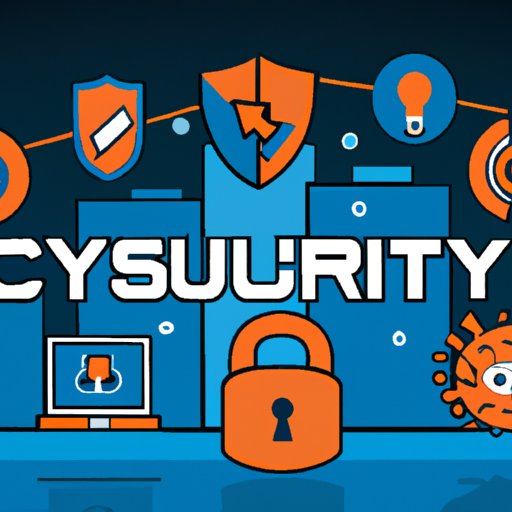Introduction
Cybersecurity is a rapidly growing field with a wide range of career opportunities. As technology advances and data becomes increasingly valuable, the need for professionals who can protect networks, systems, and data from malicious actors grows. But is cybersecurity hard to learn? In this article, we’ll explore the difficulty of becoming a cybersecurity professional and discuss how to overcome the challenges of the field.
Examining the Difficulty of Becoming a Cybersecurity Professional
The first step to becoming a cybersecurity professional is understanding what the field entails. According to the National Institute of Standards and Technology (NIST), “Cybersecurity is the practice of protecting networks, systems, and programs from digital attacks. These attacks are usually aimed at accessing, changing, or destroying sensitive information, extorting money from users, or interrupting normal business processes.”
In order to become a cybersecurity professional, you must understand both the technical aspects of the field and the legal and ethical implications. You must also be familiar with the latest cybersecurity tools and techniques, have strong problem-solving skills, and be able to think on your feet. While these skills can be learned, they do require time and effort to master.
In addition to the technical skills required, there are also a number of certifications that can help you stand out in the field. The most common certifications include CompTIA Security+, Certified Information Systems Security Professional (CISSP), and Certified Ethical Hacker (CEH). Each certification has its own set of requirements and exams, which can be difficult to pass. Completing these certifications can take months or even years, depending on the level of experience and dedication.
Once you have the necessary skills and certifications, you must then decide which area of cybersecurity you want to specialize in. Common specialties include network security, application security, cloud security, and mobile security. Each area has its own unique challenges and complexities, so it’s important to understand the differences between them before making a decision.
Exploring the Challenges of Cybersecurity in Today’s Digital World
The digital world is constantly changing and evolving, which makes cybersecurity a particularly challenging field. Cybercriminals are constantly developing new methods to attack networks and systems, and the threat landscape is ever-evolving. As a result, cybersecurity professionals must stay up-to-date on the latest trends and developments in the field in order to effectively protect their clients.
In addition, the rapid pace of technological advancement means that new technologies and tools are constantly emerging. Cybersecurity professionals must be able to quickly adapt to these changes and leverage the latest tools and techniques to stay ahead of attackers. This requires a deep understanding of the technology and the ability to quickly identify and address potential vulnerabilities.
Is Cybersecurity Too Hard to Learn?
For many people, the prospect of learning cybersecurity can be daunting. However, with the right approach, it is possible to become an expert in the field. The first step is to assess your current skill level and determine where you need to focus your efforts. This will help you develop a comprehensive learning plan that includes courses, tutorials, and hands-on projects.
It’s also important to seek out professional guidance when learning cybersecurity. Mentors and instructors can provide invaluable insights and advice that can help you navigate the complexities of the field. Additionally, joining a network of professionals can help you stay up-to-date on the latest developments and trends.

What It Takes to Become an Expert in Cybersecurity
Becoming an expert in cybersecurity requires dedication and perseverance. It’s important to start by building a solid foundation of knowledge. This includes taking courses and tutorials on the basics of cybersecurity, such as network security and cryptography. Additionally, working on relevant projects can help you gain practical experience and hone your skills.
It’s also important to join a network of professionals who can provide support and guidance. Participating in online forums and attending conferences and seminars can help you stay up-to-date on the latest developments and trends. Finally, it’s important to continually challenge yourself and strive to improve your skills.

How to Overcome the Challenges of Cybersecurity
Overcoming the challenges of cybersecurity requires commitment and dedication. First and foremost, it’s important to prioritize education and training. Taking courses, reading books, and participating in online communities can help you stay up-to-date on the latest developments and trends. Additionally, it’s important to identify and address any weaknesses in your skillset.
It’s also important to stay up-to-date on the latest technologies and tools. Following industry news and attending conferences and seminars can help you stay abreast of the latest developments. Finally, it’s important to continually challenge yourself and strive to improve your skills.
Conclusion
In conclusion, while cybersecurity is a difficult field to master, it is possible to become an expert with the right approach. Understanding the requirements, complexities, and challenges of the field is essential for success. Additionally, it’s important to prioritize education and training, stay up-to-date on the latest developments, and continually challenge yourself. With the right skills, knowledge, and dedication, anyone can become an expert in cybersecurity.
(Note: Is this article not meeting your expectations? Do you have knowledge or insights to share? Unlock new opportunities and expand your reach by joining our authors team. Click Registration to join us and share your expertise with our readers.)
